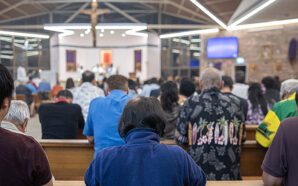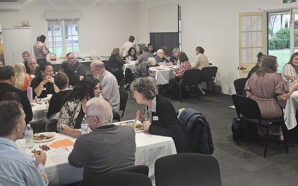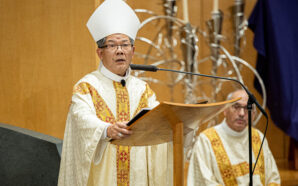Homily for the 3rd Sunday of Easter
Acts 3:13-17,17-19; Psalm 4; 1 John 2:1-5; Luke 24:35-48
14 April 2024
In these days after Easter we contemplate the scenes of the Risen Jesus with his disciples and the later scenes of the disciples proclaiming the word fearlessly to all and sundry.
In the first lot of scenes, as in today’s gospel, the disciples are ‘in a state of alarm and fright’ thinking ‘they were seeing a ghost’. Jesus greets them with the words ‘Peace be with you.’ By doing so, he actually gives them that peace. Jesus then tells the disciples that they are witnesses to the preaching of a message of repentance – repentance for the forgiveness of sins; a message preached to all the nations.
Listen at https://soundcloud.com/frank-brennan-6/homily-14424
There’s no assurance that the disciples will always preach the truth, that which is right. There’s no assurance that the disciples will always do that which is right. Whether they preach what is right or wrong, whether they do what is right or wrong, they are assured forgiveness if they repent of their sins.
In the second lot of scenes, as in today’s first reading from the Acts of the Apostles, the disciples fearlessly go forth proclaiming the message: ‘Now you must repent and turn to God, so that your sins might be wiped out.’ The disciples are sent out to proclaim forgiveness. They’re not sent out to teach the Catechism or unwavering adherence to Vatican declarations.
This past week, there has been a lot of attention given to the church’s Dicastery for the Doctrine of the Faith (the old CDF, sometimes parodied in Monty Python as the Inquisition). The Dicastery is now under the leadership of Pope Francis’s friend and fellow Argentinian Víctor Manuel Cardinal Fernández. Fernandez has a style very different from his predecessors like Pope Benedict who as a cardinal filled the role for many years during the papacy of John Paul II.
Last year, the dicastery gave the green light to priests offering a blessing to persons in irregular relationships, including those in same-sex relationships. On Wednesday night, the ABC 7.30 program broadcast a story on the Church’s novel approach to the blessing of same-sex couples. Dr Angela McCarthy, a theologian from the University of Notre Dame, was interviewed about the Vatican declaration entitled Fiducia Supplicans. She accurately pointed out: ‘The African bishops have made it very clear that they won’t be accepting this declaration. Alternative to that is what’s happening in Germany and the bishops are calling for a review of the understanding of same-sex relationships within the church.’[1] The ABC reported: ‘7.30 approached the Archbishops of Sydney, Melbourne, Canberra, Brisbane, Perth, Adelaide and Hobart for interview. None accepted our invitation.’
The program was more than a month in the making, so there would have been every opportunity for one of our archbishops to say something if he’d wanted to. Perhaps our Australian bishops disagree with the Vatican declaration. Maybe they agree with it, but don’t think it would be useful to say too much about it. It might upset some of the faithful, and confuse members of the public. Or else maybe our bishops cannot agree and choose to remain silent in solidarity with each other. Given the confusion in the pews and in the street about the issue, you’d think the bishops would take the opportunity to provide some clarity about the practical application, if any, of the Vatican’s declaration here in Australia. We’re all left wondering about the purpose of these Vatican declarations.
Earlier in the week, we were all coming to terms with yet another declaration from the Roman dicastery. This one is entitled Dignitas Infinita. It deals with the topic of human dignity. It falls into two distinct parts. In the first part, the theologians discuss the idea of human dignity. They tell us: ‘[D]ignity is not something granted to the person by others based on their gifts or qualities, such that it could be withdrawn. Were it so bestowed, it would be given in a conditional and alienable way, and then the very meaning of dignity (however worthy of great respect) would remain exposed to the risk of being abolished. Instead, dignity is intrinsic to the person: it is not conferred subsequently (a posteriori); it is prior to any recognition, and it cannot be lost. All human beings possess this same intrinsic dignity, regardless of whether or not they can express it in a suitable manner.’[2] The authors of the Dicastery document go on to insist: ‘The Church proclaims the equal dignity of all people, regardless of their living conditions or qualities. This proclamation rests on a threefold conviction, which—in the light of Christian faith—gives human dignity an immeasurable value and reinforces its intrinsic demands.’[3]
That threefold conviction is born of three distinct Christian aspects about human dignity:
- ‘the dignity of the human person comes from the love of the Creator, who has imprinted the indelible features of his image on every person’;
- ‘the dignity of the human person was revealed in its fullness when the Father sent his Son, who assumed human existence to the full’;
- the dignity of the human person rests above all on the fact that we are called to communion with God.
This is all very fine.
But the second part of the document goes on to pick up a large, diverse shopping list of items which are categorised as grave violations of human dignity. They include poverty, war, the travail of migrants, human trafficking, sexual abuse, violence against women, abortion, surrogacy, euthanasia and assisted suicide, the marginalisation of people with disabilities, gender theory, sex change, and digital violence.
How did gender theory and sex change get in there? What particular insights does the Dicastery have to offer on these complex novel problems? It’s not all that long ago that the Dicastery was condemning IVF (in vitro fertilisation) even when the baby was produced from the husband’s sperm and the wife’s ovum. In 1987, the Dicastery said: ‘Such fertilisation is in itself illicit and in opposition to the dignity of procreation and of the conjugal union, even when everything is done to avoid the death of the human embryo.’[4] Thankfully the Dicastery has not repeated this claim in their latest document. IVF is no longer listed as a grave violation of human dignity.
All of us know couples who have had an IVF baby and many of them give thanks to God that science was able to help them fulfil their wedding vow to be open to bearing of each other’s children and to bringing them up according to the law of Christ and his Church. Many of those couples and their IVF children are convinced that their human dignity was enhanced, not degraded, by the availability of IVF. Most of those adults who were IVF babies would be as perplexed as I am by the 1987 Dicastery’s claim that ‘The one conceived must be the fruit of his parents’ love. He cannot be desired or conceived as the product of an intervention of medical or biological techniques; that would be equivalent to reducing him to an object of scientific technology.’[5] Try telling that to a loved IVF child or her doting parents.
Critics inside and outside the Church are already condemning this latest document for simplistically buying into novel issues such as gender theory and sex change. Why not leave such complex issues for another document and another day?
We all need the humility and the patience to attend to the science and to listen to the experts.[6] But we also need to proclaim fearlessly the need to protect the dignity of all persons, especially those who are most vulnerable and marginal.
The Dicastery concludes: ‘[I]n the face of so many violations of human dignity that seriously threaten the future of the human family, the Church encourages the promotion of the dignity of every human person, regardless of their physical, mental, cultural, social, and religious characteristics. The Church does this with hope, confident of the power that flows from the Risen Christ, who has fully revealed the integral dignity of every man and woman.’[7]
Let’s promote the human dignity of all persons with renewed passion in the wake of Easter. And let’s have the humility to ask whether we as Church have done so? What are the things for which we need to repent and turn to God, so that our sins might be wiped out?
In the spirit of today’s readings, let’s be willing to proclaim fearlessly God’s love and forgiveness for all, especially those who don’t quite get it right all the time in their thinking and in their actions. They are the very ones the Risen Lord has come to save. You and I are included in that group.
Let me leave you with a riddle. If the Church does encourage ‘the promotion of the dignity of every human person, regardless of their physical, mental, cultural, social, and religious characteristics’, why does it not permit the ordination of women? And is it the case that Christian churches which espouse the equal dignity of all persons over and above the constraints of tradition are those who are truer to the spirit of the gospels when they allow women to be ordained, just like men? These are important questions for a synodal church committed to the infinite dignity of all its members. If our Church has good theological reasons for not extending equal dignity to everyone, we need to know.
From the start of 2024, Fr Frank Brennan SJ will serve as part of a Jesuit team of priests working within a new configuration of the Toowong, St Lucia and Indooroopilly parishes in the Archdiocese of Brisbane. Frank Brennan SJ is a former CEO of Catholic Social Services Australia (CSSA). Fr Frank’s latest book is An Indigenous Voice to Parliament: Considering a Constitutional Bridge, Garratt Publishing, 2023.
[1] See https://www.abc.net.au/news/2024-04-10/vatican-approves-blessings-for-same-sex-couples-in-new-ruling/103693210
[2] Dignitas Infinita, #15available at https://www.vatican.va/roman_curia/congregations/cfaith/documents/rc_ddf_doc_20240402_dignitas-infinita_en.html,.
[3] Dignitas Infinita, #17.
[4]Donum Vitae, #6, available at https://www.vatican.va/roman_curia/congregations/cfaith/documents/rc_con_cfaith_doc_19870222_respect-for-human-life_en.html,
[5] Donum Vitae, #4.
[6] See for example The Cass Review: Independent Review of Gender Identity Services for Children and Young People, 2024, available at https://cass.independent-review.uk/home/publications/final-report/. Bernard Lane writes: ‘Meagre evidence, no real consensus among clinicians and a risk of lifelong harm to children. If this isn’t enough to prod our politicians towards a national inquiry, they may find it harder to ignore the negligence lawyers and medical indemnity insurers.’ See https://www.theaustralian.com.au/inquirer/deceptive-promise-of-the-dutch-protocol/news-story/9b745c5e92eb10cef50b22943fdbcf57
[7] Dignitas Infinita, #66.








